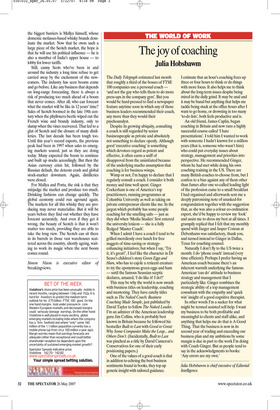The joy of coaching
Julia Hobsbawm
The Daily Telegraph estimated last month that roughly a third of the bosses of FTSE 100 companies use a personal coach — ‘and not the guy who tells them to do more press-ups in the company gym’. But you would be hard-pressed to find a newspaper feature anytime soon in which any of those business leaders recommended their coach, any more than they would their psychoanalyst.
Despite its growing ubiquity, consulting a coach is still regarded by senior businesspeople as private and absolutely not something to declare openly. Although good ‘executive coaching’ is something which devotees regard as potent and effective, it often earns a sniff of disapproval from the uninitiated because of the underlying macho assumption that coaching is for business wimps.
Wimp or not, I’m happy to declare that I regularly consult a coach. I consider it both money and time well spent. Ginger Cockerham is one of America’s top practitioners, running programmes at Columbia University as well as taking on private entrepreneur clients like me. In the jargon which probably has some people reaching for the smelling salts — just as they did when ‘Media Studies’ first entered the university lexicon — she is a fully fledged ‘Master Coach’.
When I admit I have a coach I tend to be grilled mercilessly over lunch for free nuggets of time-saving or strategyenhancing initiatives; but when I say, ‘Try it, it’s great!’, I feel like the character in Dr Seuss’s children’s story Green Eggs and Ham, who has to cajole a reticent creature to try the eponymous green eggs and ham — until the famous Seussian sceptic declares, amazed, ‘I do like it! I do!!’ This may be why the world is now awash with business titles on leadership, coaching and mentoring. They have catchy titles such as The Naked Coach: Business Coaching Made Simple, just published by David Taylor to follow The Naked Leader. I’m an admirer of the American leadership guru Jim Collins, who is probably best known in Britain because he followed his bestseller Built to Last with Good to Great: Why Some Companies Make the Leap... and Others Don’t. (Incidentally, Built to Last was pinched as a title by David Cameron’s Conservatives for one of their early positioning papers.) One of the values of a good coach is that in addition to echoing the best business sentiments found in books, they top up generic insight with tailored guidance. I estimate that an hour’s coaching frees up three or four hours to think or do things with more focus. It also helps me to think about the long-term issues despite being mired in the daily grind. It may be anal and it may be banal but anything that helps me tackle being stuck at the office hours after I want to go home, or drowning in too many ‘to-do lists’, both feels productive and is.
An old friend, James Caplin, began coaching in Britain and now runs a highly successful course called ‘I hate presentations’. I told him I wanted to work with someone I hadn’t known for a million years (that is, someone who wasn’t him) who could put everyday issues about strategy, management and priorities into perspective. He recommended Ginger, whom he had met while doing his own coaching training in the US. There are many British coaches to choose from, but I confess to a bias against any of them other than James after one so-called leading light of the profession came to a small breakfast I had organised and afterwards sent me a deeply patronising note of unasked-for congratulation together with the suggestion that, as she was also a colour co-ordination expert, she’d be happy to review my ‘look’ and assist me to dress my best at all times. I grumpily replied that I felt that my monthly spend with Jaeger and Jasper Conran at Debenhams was satisfactory, thank you, and turned instead to Ginger in Dallas, Texas for coaching counsel.
Naturally I don’t fly to the US twice a month; I do ‘phone coach’ instead (very time efficient). Perhaps I prefer having an American coach because there’s an inherent warmth underlying the famous American ‘can do’ attitude to business strategy and management that I particularly like. Ginger combines the strategic ability of a top management consultant with the empathy and ‘quick win’ insight of a good cognitive therapist.
In other words I’m a sucker for what might be termed assisted self-help. I want my business to be both profitable and meaningful to clients and staff alike, and anything that helps me do that is A Good Thing. That the business is now in its second year of trading and exceeding our business plan and my ambitions by some margin is due in part to the work I’m doing with Coach Ginger. But as people tend to say in the acknowledgments to books: ‘Any errors are my own.’
Julia Hobsbawm is chief executive of Editorial Intelligence.


















































































 Previous page
Previous page